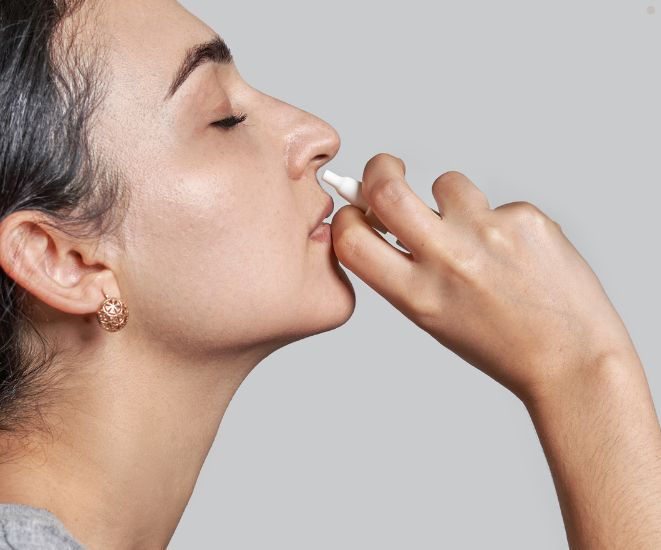How to Treat Nasal Polyps
Nasal polyps are noncancerous growths in the lining of your nasal passages or sinuses, which can cause inflammation, breathing difficulties and frequent sinus infections. This article will focus on different treatment options for nasal polyps, including a variety of natural remedies.
Medications for Nasal Polyps
Medications are often the first line of treatment for nasal polyps and have a relatively high success rate depending on the severity of the case. Medication can help shrink the polyps and reduce symptoms. Common options include:
Corticosteroids are anti-inflammatory medicines that can treat a variety of conditions. Examples of corticosteroids that can treat polyps include:
- Oral corticosteroids. Medications like prednisone are prescribed for short-term use to reduce inflammation and shrink polyps.
- Nasal corticosteroids. Sprays like fluticasone, mometasone or budesonide are used regularly to control inflammation and prevent regrowth.
Other medications commonly prescribed include:
- Antihistamines. These are useful if allergies are contributing to inflammation.
- Decongestants. Over-the-counter options can temporarily relieve nasal congestion but should not be used long-term.
- Biologic therapies. Dupilumab (Dupixent) is a newer option that targets specific pathways involved in inflammation. It’s particularly effective for people with nasal polyps and asthma.
Nasal Sprays for Nasal Polyps
Nasal sprays are excellent options for treating nasal polyps, offering localized relief without systemic side effects. Some examples include:
- Steroid sprays. These reduce swelling and can shrink polyps over time. Examples include Fluticasone (Flonase), Mometasone (Nasonex) and Budesonide (Rhinocort).
- Saline sprays. Non-medicated sprays help keep nasal passages moist and flush out irritants.
- Combination sprays. Some sprays combine steroids with antihistamines for added effectiveness.
For best results, follow the prescribed usage instructions, as overuse or incorrect technique can reduce effectiveness.
Surgical Options for Nasal Polyps
There may be some cases of nasal polyps where medication isn’t quite enough. This is usually in more severe situations. In this case, surgery may be recommended. Surgical options include:
- Polypectomy. This minimally invasive procedure removes polyps using a small suction device or microdebrider. This is usually a quick procedure and is typically performed under local or general anesthesia.
- Endoscopic sinus surgery. This advanced procedure involves using an endoscope to remove polyps and open up sinus pathways. It’s recommended for larger or recurring polyps and can improve sinus drainage.
Surgery is not a permanent cure, as polyps can regrow. Post-surgery, ongoing use of nasal corticosteroids or other medications is often necessary to prevent recurrence.
Natural Remedies for Nasal Polyps
Some people prefer more natural remedies for treatment. While natural remedies may not eliminate nasal polyps, they can help reduce inflammation and alleviate symptoms. Here are some approaches:
- Saline nasal irrigation. Using a saline spray or neti pot can rinse out irritants and allergens, helping to reduce nasal inflammation.
- Steam inhalation. Breathing in steam from a bowl of hot water or a humidifier can help open up nasal passages and reduce congestion.
- Essential oils. Oils like tea tree oil, eucalyptus and peppermint may have anti-inflammatory properties. Dilute them with a carrier oil and inhale the vapors or use in a diffuser.
- Dietary changes. Consuming anti-inflammatory foods such as turmeric, ginger and omega-3 fatty acids may support overall sinus health.
- Avoid irritants. Minimize exposure to allergens, smoke and strong chemicals that can worsen inflammation.
Preventing Nasal Polyps
While it’s not possible to completely prevent nasal polyps from occurring, there are preventive measures you can take to help reduce the likelihood of nasal polyp development or recurrence. Some of these options include:
- Manage allergies and asthma. Controlling these conditions reduces inflammation that contributes to polyp formation.
- Use a humidifier. Keeping indoor air moist can prevent nasal dryness and irritation.
- Avoid nasal irritants. Steer clear of allergens, smoke and strong odors.
- Maintain good hygiene. Regular handwashing and avoiding sick individuals can reduce the risk of infections that may lead to polyp growth.
- Introducing healthy habits. Healthy habits, such as eating well, exercising and avoiding smoking, can help you stay generally healthy and avoid sickness.
Final Notes
Nasal polyps can significantly impact quality of life, but a combination of treatments can provide relief. Working closely with a healthcare provider to develop a tailored treatment plan is the best way to address nasal polyps and prevent recurrence. By taking proactive steps and following prescribed therapies, you can breathe easier and enjoy improved sinus health.

